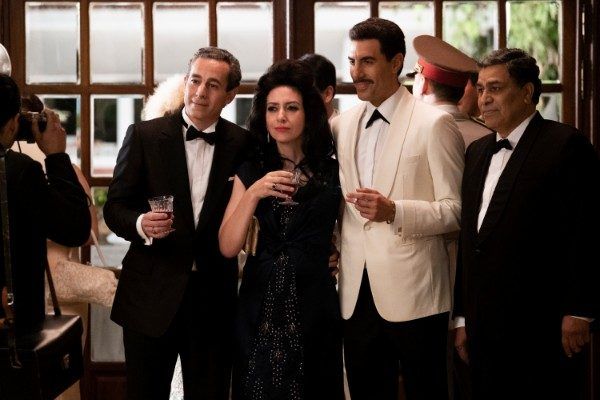Netflix's new limited series The Spy begins with a simple question: Who is our protagonist? Sure, we know who is playing him. That would be Sacha Baron Cohen, making a stunning and rare turn into a dramatic role that challenges him and offers him an opportunity to sell himself as a masterful leading man in a series which tells the story of actual Israeli spy Eli Cohen. But let's get back to the original question. The protagonist of The Spy is a man who wears two faces, who is forced to switch between them as the situation requires. The mustache remains the same, the wavy hair maintains its sheen, the demeanor is frequently calm, but who are we looking at really?
Eli Cohen (Baron Cohen) is a Jewish Egyptian immigrant living in Tel Aviv, Israel who goes from working in a department store to getting recruited by Mossad by his eventual handler, Dan Peleg (Noah Emmerich, returning to some familiar territory he once occupied in FX's The Americans). The year is 1959 and the modern Israel we know today has only been a nation for a little over a decade. The deep wounds of the horrors of World War II are fresh, the tensions between Israelis and Arabs are high; conflict is around every corner. As part of a push to gain more information about Syria's motivations against Israel, Eli begins training as a spy and eventually assumes the identity of Kamel Amin Thaabet. As Kamel, Eli is tasked with getting close to Syrian officials in an effort to obtain information about any plans or movements against Israel. It's a mission laden with life-threatening risks but one Eli is willing to take on because he loves his country.
If ever there was an actor best suited to playing a character regularly changing his personality and appearance based on those he's interacting with, it's Baron Cohen. The actor has made a name for himself donning thoroughly outlandish costumes for raunchy comedies like Borat and The Dictator. His most recent chameleonic turn as a series of questionable characters for his 2018 Showtime series Who Is America?. It feels as if all of Baron Cohen's previous work has been a practice round to play Eli/Kamel, where the physical changes are arguably imperceptible (Eli grows a mustache, changes his accent, and dons nicer suits to become Kamel) but make such an impact on the performance. At the risk of hyperbolic — although I firmly stand by it — Baron Cohen is turning in career-best work in The Spy.
Past roles inform aspects of his turn as Eli/Kamel but this is an actor who has clearly done his homework in studying up on the actual life of Cohen. Baron Cohen moves easily between his "Eli" and "Kamel" identities to convincing and effective ends. As Kamel, you can feel all of the tension in his body as Eli plays Kamel, commiserating at a party with Syrian General Amin Al-Hafez (Waleed Zuaiter) in an attempt to earn his trust while also acting so suave there's seemingly no tension at all. Baron Cohen has put himself in similarly tense-but-casual situations before on Who Is America? so the groundwork is laid to work from but here, in The Spy, he navigates the situation with masterful nuance. Baron Cohen is in control here and thus, gives a controlled but fascinating performance; you don't want to miss a moment of his time onscreen.
Also to the show's credit, this is a fully-realized world. Unlike Mad Men's flashy depiction of the early '60s, The Spy remains true to the period while also maintaining a healthy sense of realism about location, class, and character. Sure, you'll have serious Connery-in-Dr. No flashbacks as you watch Eli transform his portable Samsonite electric shaver and an electric hand mixer into a telegraph to send messages after being shown how to do it by the show's Q equivalent, Abou Mahmoud, played by Ahmed Boulane. But the costumes, cars, sets (a Zurich train station is particularly eye-catching), and beyond all add authenticity to the time period without feeling gimmicky.
As exciting as it is to see Baron Cohen take on a leading role or see the Middle East rendered to be period-specific without feeling rote, things get a little shaky with The Spy when you look elsewhere. Emmerich seems to struggle with his accent work, which occasionally takes you out of an otherwise committed, compelling performance as a Mossad agent wracked with guilt over the personal burdens of the job. Series creator, writer, and director Gideon Raff (creator of the Israeli series Prisoners of War which was later adapted for U.S. audiences as Homeland) makes choices in his scripting which also seem more hindrance than a help. There's a utilitarianism to the dialogue which works well when it comes to the spy side of the story but in more personal or intimate scenes, especially when it comes to exploring Eli's interiority as he works, there seems to be a hesitation to explore what psychological and emotional tolls this kind of work can have on a person. Even when we regularly return to Dan's wrestling with his own guilt, the growth and deeper understanding of the roots of those traumas don't seem to be cohesive or well-articulated.
That said, The Spy is six episodes long, each clocking in at an hour, give or take. All of the parts work well together — from the cast to the script to the direction and beyond — to make for a compelling watch. The is timely value in seeing this story brought to life, especially in considering where the roots of modern political conflicts are situated and how they came to be, as seen through the eyes of one man at the heart of it all. Come to The Spy for Baron Cohen's performance but stay for this series' tense drama borne out of the life of a mid-century spy.
Rating: B+
The Spy is available to stream on Friday, September 6 on Netflix.




